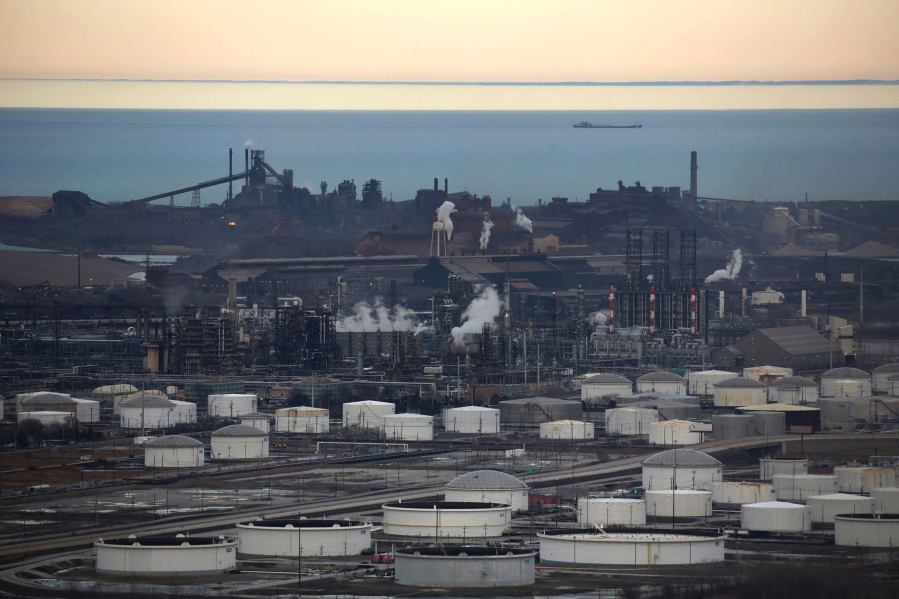CHICAGO — Frustrated that U.S. oil refineries are still allowed to dump massive amounts of toxic chemicals and heavy metals into lakes and rivers, environmental groups are urging a federal court to order more stringent regulation of some of the nation’s biggest polluters.
A petition filed Tuesday accuses the U.S. Environmental Protection Agency of violating the federal Clean Water Act by failing to require standards reflecting current pollution-control technologies for refiners and six other industries.
The legal action comes three months after the nonprofit Environmental Integrity Project found some of the worst polluters are in the Chicago area.
During 2021 alone, 81 refineries in the United States that treat waste on-site released 1.6 billion pounds of chlorides, sulfates and other dissolved solids harmful to fish and other aquatic life, the group determined in its review of federal data.
The refineries also collectively discharged 60,000 pounds of selenium, an element that can mutate fish, and 15.7 million pounds of nitrogen, which contributes to water-fouling algae blooms and dead zones in important fisheries such as the Great Lakes, Chesapeake Bay and the Gulf of Mexico.
Only three other refineries discharged more selenium than the BP refinery in Whiting, Indiana, located on the southwest shore of Lake Michigan about eight miles from one of Chicago’s water intake cribs. Small doses of the element are considered part of a healthy diet, but higher levels can cause hair and nail loss, gastrointestinal distress, dizziness and tremors.
“Besides the lake being a major source of recreation for the region (swimming, fishing, boating, surfing), it’s the resource for drinking water,” said Mitch McNeil, chair of the Chicago chapter of the Surfrider Foundation, one of the other groups behind the new petition.
Two other local refineries — Citgo Lemont and ExxonMobil Joliet — ranked fifth and ninth for selenium pollution, respectively, according to federal data. Both discharge pollution into waterways connected to the Illinois and Mississippi rivers.
Some refinery pollution is legal because federal and state officials have failed to limit it, despite requirements in the 1972 Clean Water Act mandating a review of standards for various chemicals and metals at least every five years based on the latest science and improvements in water treatment technology.
The legal petition accuses the EPA of abusing its authority by failing to update standards that in some cases haven’t changed since the mid-1970s. Limits on water pollution from refineries were last updated in 1985.
“No one should get a free pass to pollute,” said Jen Duggan, the Environmental Integrity Project’s deputy director.
Other groups behind the petition include the Center for Biological Diversity, Clean Water Action, Waterkeeper Alliance, Food & Water Watch, Environment America, Bayou City Waterkeeper, Black Warrior Riverkeeper, Healthy Gulf, San Antonio Bay Estuarine Waterkeeper, San Francisco Baykeeper and Tennessee Riverkeeper.
In addition to targeting refineries, the groups are asking the U.S. District Court Appeals for the 9th Circuit to order new standards for two categories of chemical manufacturers, plastics companies and factories that make fertilizers, pesticides and nonferrous metals.
One of the oil industry’s chief trade groups, American Petroleum Institute, did not directly answer questions in January about the lack of standards for selenium and other pollutants.
“Our industry takes seriously its obligation to protect our nation’s waters and adheres to strict local, state and federal requirements to ensure water is properly treated and tested prior to leaving a facility,” Will Hupman, the trade group’s vice president of downstream policy, said at the time.
BP said it will “continue to operate consistent with its permit as part of our commitment to safe, compliant and reliable operations, not just at Whiting refinery but at every facility BP operates around the world.”
The EPA has not responded to the analysis of refinery pollution.
Environmental groups asked EPA Administrator Michael Regan in 2021 why the agency had fallen behind in meeting its legal obligations under the Clean Water Act. Agency officials acknowledged the letter but didn’t respond.



